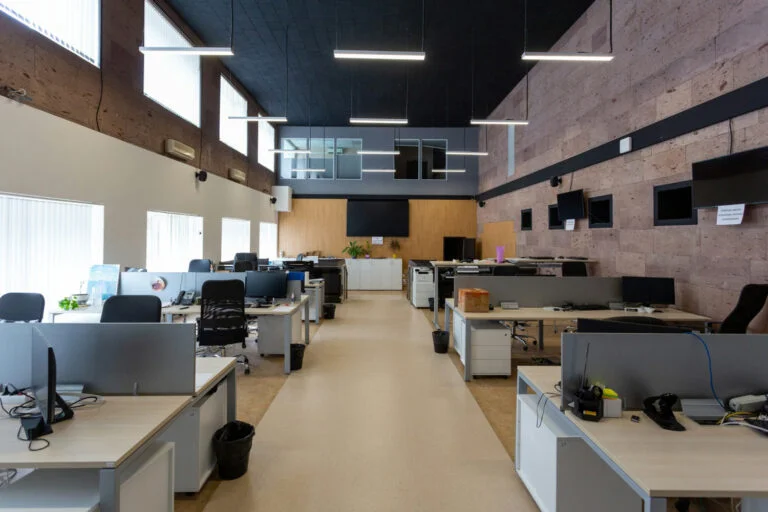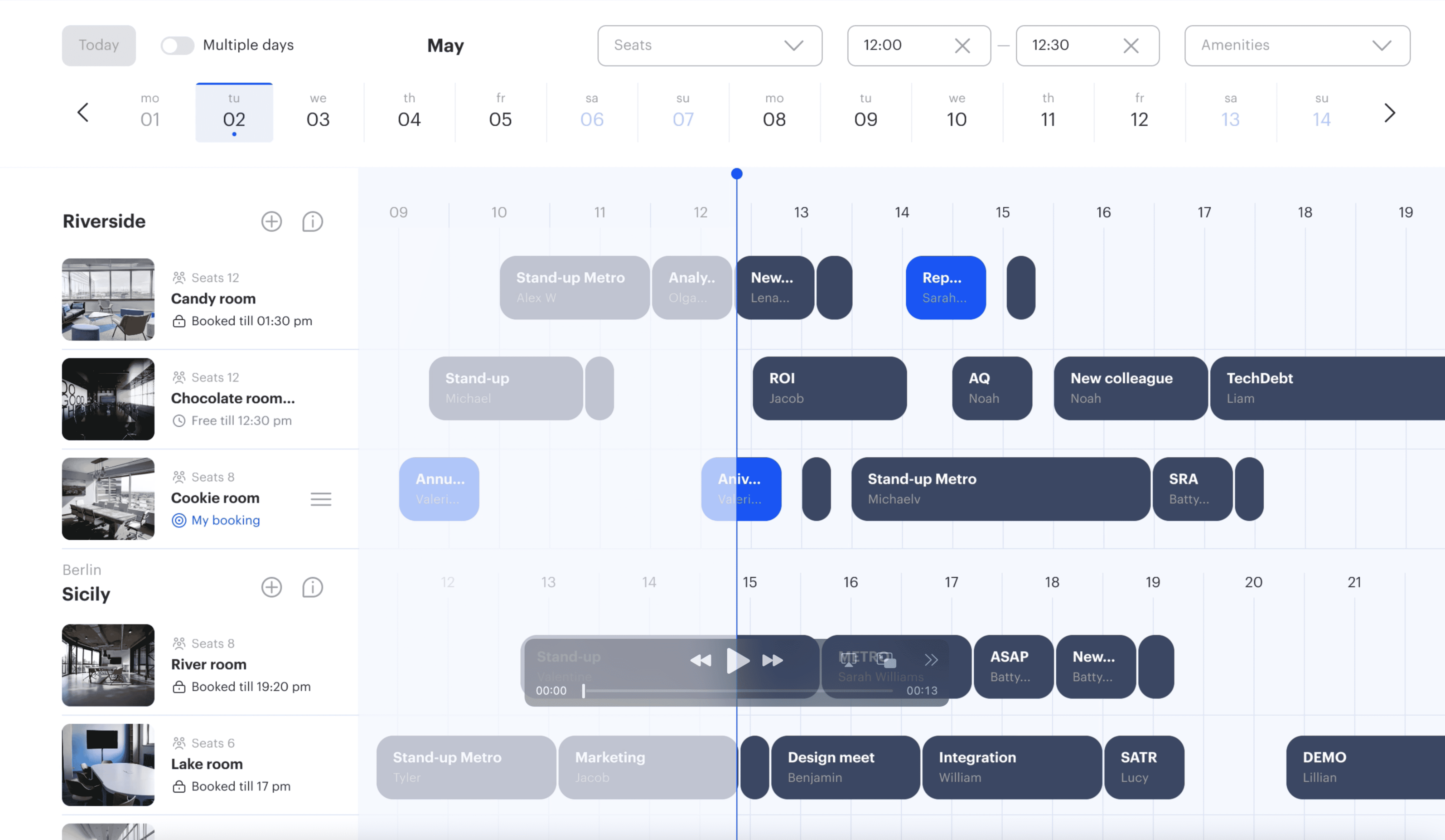Based on research by Gallup, half of the U.S. workforce employed in remote-capable jobs are switching to hybrid work nowadays, which is proclaimed the future of the office. While some companies struggle to return their staff to a traditional working environment, others adopt more flexible options, including hoteling desk space.
What Is Office Hoteling?
Hoteling is one of the trending activity-based workplace models and office management systems, sourcing its inspiration from the hospitality industry. Much like with hotels, a company’s employees book a working space in an office for a certain period, check in upon their arrival, and check out when they finish their work. Apart from desks, they can reserve cubicles, meeting rooms, phone booths, and other facilities provided in the hoteling space and equipped with modern technologies, such as high-speed internet, multimedia equipment, multi-function peripherals, VoIP, and so on.
The bookable offices give flexibility in managing a company’s diverse workforce and can be used not only for full-time and part-time employees but also for freelancers, contractors, hybrid teams, and any other visitors approved by the company. An office hotel space may come with a different set of facilities and technologies available for visitors, as well as various methods of managing reservations.

How Hoteling Differs from Other Office Desk Arrangements
The main difference between hotelling desks and the traditional office concept is that the reservable workstations are not assigned to any particular employee and the personnel books them as the need arises rather than for usual office hours. By giving access to a shared office with an open-space layout and creating a collaborative environment, hoteling works similarly to coworking, yet it can provide reservation services only for employees of one company, while coworking spaces bring together workers from different businesses. Hotelling desks also differ from hot desking where an employee can get a workstation without prior reservation.
UnSpot, a robust all-in-one office hotel space managing software, enables employees to easily book tables, schedule their visits, view meeting rooms available for booking, and promptly resolve issues via a centralized ticketing platform.
With UnSpot, remote employees can plan their office work for a month ahead from laptops and mobile devices, which removes any stress and confusion.
Benefits of Hotelling Desks for Employers
Companies can transform their office management to be more efficient, agile, and friendly for both employees and partners.
Employers can reduce up-front expenses by maintaining smaller offices capable of accommodating a larger number of workers, as at least some of the desks will be occupied part-time and thus will be available for several team members within a week or even a day. For example, the insurance giant Allstate was able to cut real estate spending in half by switching to WFH, smaller offices, and flexible hotelling desks.
Since employees are empowered to choose places and people to work with based on their actual needs and tasks, they can work more productively and feel more engaged. In turn, employers can be more competitive in hiring and retaining top talent by offering them dynamically scheduled hotelling desks since with the massive shift to hybrid work, up to 76% of employees are ready to leave their office if flexible work ends.
As workstation reservation is performed via some kind of software that gathers office space utilization analytics, companies can better plan their resources and make data-driven decisions about scaling their square footage up or down. Businesses can also use their reservation apps to manage visitors and create a smoother experience for partners, clients, and contractors by ensuring that spaces and people are ready to welcome visitors and providing them with clear indoor navigation through digital maps.
Office Hoteling Advantages for Employees
A flexible hoteling space can yield many benefits not only for employers but also for employees. According to a study conducted by OnePoll and TravelPerk, 44% of hybrid workers cite disconnection from their team and a lack of face-to-face interaction as the main drawbacks of remote work. Thanks to the convenient reservation of meeting rooms and desks, they can overcome the isolation barrier and enjoy better collaboration. The same study says that 25% of WFH employees suffer from distractions or lack of equipment at home. Fast access to fully equipped hotelling desks and privacy-friendly zones gives remote workers exactly the environment to get the job done.
Mobile workers and employees traveling between branch offices in other cities or even countries will also benefit from easy access to the resources they need and a streamlined workplace experience. Besides, the possibility to choose how, when, and where employees work helps build trust in the workplace, enhances employee well-being, and increases job satisfaction by up to 67%. Unlike hot desking working on a first-come, first served basis, the hoteling system ensures confidence that a required number and configuration of workspaces will be available for employees when they need them.
What Are the Challenges of Office Hoteling?
Like with other unassigned workstations and shared office options, implementing hoteling in the workplace is not free from some traps and pitfalls:
- Overcrowding on peak days. There is always a possibility that the number of people wishing to visit the office during the busiest times will exceed the number of available workstations
- Poorer visibility into key people. It’s easier to get help and guidance from key people in a team when an employee knows when and where they are located, which might not be the case with office hotel space
- Less personal workspaces. Employees can be frustrated by scarce opportunities to personalize their working space and can even feel underestimated if their company fails to assign them a fixed place
- Hampered access to shared resources. When members of one team cruise around the office all the time, it becomes tricky to find reference materials and other shared resources
- Struggles with finding a convenient place to work. An unassigned workspace means the early bird gets the worm, so latecomers can face difficulties with finding comfortable seating arrangements for focused work or enough workstations for a big team
- Sanitation concerns. With several people sharing a workstation during the day, keeping it clean and preventing the spread of diseases create another challenge
Luckily, at least some drawbacks of hotelling desks can be negated by following best practices.
Best Practices in Hoteling: How to Implement the System
Office management transformation is a great upheaval for a company, so it needs to be handled wisely to facilitate the shift and bring value. Start with evaluating if hoteling in office space is right for your company from a cultural and logistical perspective, and explore your employees’ needs. You can win their approval by explaining what you are going to change, how it will work, and why they will benefit. It’s important to develop clear policies covering cleaning, shared resources management, reservation and prioritization rules, and other aspects of your flexible office.
You should also choose effective workplace management software to ensure simple and fail-safe booking, visibility into people and locations, seamless integration with other business tools used in your company, the possibility to hold a certain number of workstations for load balancing, and features customizable to your needs.
Make sure to rearrange your hoteling space to accommodate lockers for personal belongings, enough storage room for papers and supplies, sufficient equipment, meeting rooms of different sizes, department neighborhoods, huddle zones, and other areas that will make the workspace more flexible and comfortable to work in.
Upon learning what hoteling means and following the above recommendations, you will be able to get the maximum of your office space without compromising employee experience.









